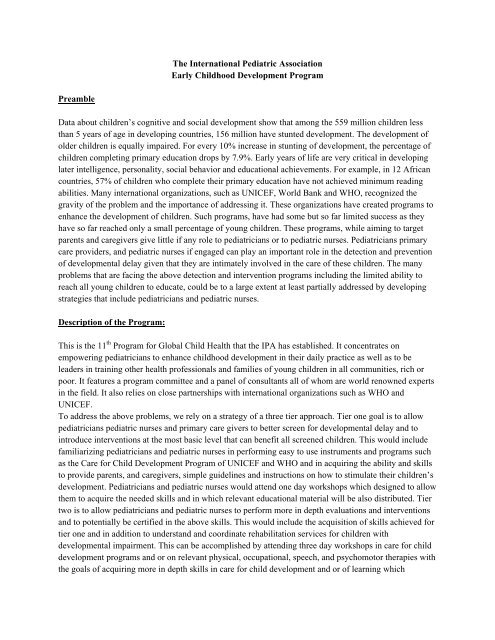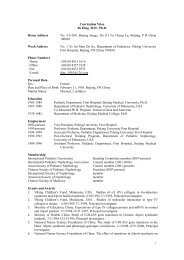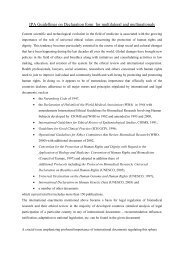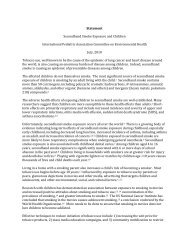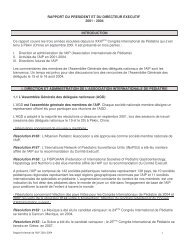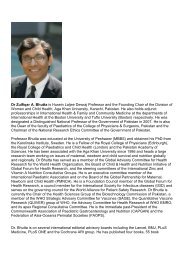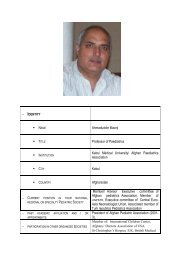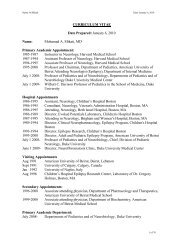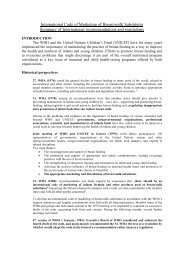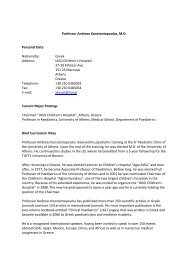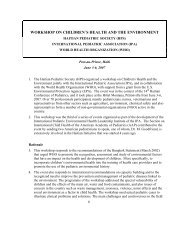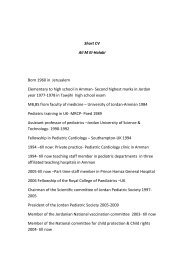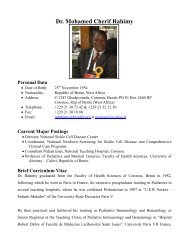The International Pediatric Association Early Childhood ... - ipa world
The International Pediatric Association Early Childhood ... - ipa world
The International Pediatric Association Early Childhood ... - ipa world
You also want an ePaper? Increase the reach of your titles
YUMPU automatically turns print PDFs into web optimized ePapers that Google loves.
<strong>The</strong> <strong>International</strong> <strong>Pediatric</strong> <strong>Association</strong><br />
<strong>Early</strong> <strong>Childhood</strong> Development Program<br />
Preamble<br />
Data about children’s cognitive and social development show that among the 559 million children less<br />
than 5 years of age in developing countries, 156 million have stunted development. <strong>The</strong> development of<br />
older children is equally impaired. For every 10% increase in stunting of development, the percentage of<br />
children completing primary education drops by 7.9%. <strong>Early</strong> years of life are very critical in developing<br />
later intelligence, personality, social behavior and educational achievements. For example, in 12 African<br />
countries, 57% of children who complete their primary education have not achieved minimum reading<br />
abilities. Many international organizations, such as UNICEF, World Bank and WHO, recognized the<br />
gravity of the problem and the importance of addressing it. <strong>The</strong>se organizations have created programs to<br />
enhance the development of children. Such programs, have had some but so far limited success as they<br />
have so far reached only a small percentage of young children. <strong>The</strong>se programs, while aiming to target<br />
parents and caregivers give little if any role to pediatricians or to pediatric nurses. <strong>Pediatric</strong>ians primary<br />
care providers, and pediatric nurses if engaged can play an important role in the detection and prevention<br />
of developmental delay given that they are intimately involved in the care of these children. <strong>The</strong> many<br />
problems that are facing the above detection and intervention programs including the limited ability to<br />
reach all young children to educate, could be to a large extent at least partially addressed by developing<br />
strategies that include pediatricians and pediatric nurses.<br />
Description of the Program:<br />
This is the 11 th Program for Global Child Health that the IPA has established. It concentrates on<br />
empowering pediatricians to enhance childhood development in their daily practice as well as to be<br />
leaders in training other health professionals and families of young children in all communities, rich or<br />
poor. It features a program committee and a panel of consultants all of whom are <strong>world</strong> renowned experts<br />
in the field. It also relies on close partnerships with international organizations such as WHO and<br />
UNICEF.<br />
To address the above problems, we rely on a strategy of a three tier approach. Tier one goal is to allow<br />
pediatricians pediatric nurses and primary care givers to better screen for developmental delay and to<br />
introduce interventions at the most basic level that can benefit all screened children. This would include<br />
familiarizing pediatricians and pediatric nurses in performing easy to use instruments and programs such<br />
as the Care for Child Development Program of UNICEF and WHO and in acquiring the ability and skills<br />
to provide parents, and caregivers, simple guidelines and instructions on how to stimulate their children’s<br />
development. <strong>Pediatric</strong>ians and pediatric nurses would attend one day workshops which designed to allow<br />
them to acquire the needed skills and in which relevant educational material will be also distributed. Tier<br />
two is to allow pediatricians and pediatric nurses to perform more in depth evaluations and interventions<br />
and to potentially be certified in the above skills. This would include the acquisition of skills achieved for<br />
tier one and in addition to understand and coordinate rehabilitation services for children with<br />
developmental impairment. This can be accomplished by attending three day workshops in care for child<br />
development programs and or on relevant physical, occupational, speech, and psychomotor therapies with<br />
the goals of acquiring more in depth skills in care for child development and or of learning which
therapies are to be used in which patient and for how long. <strong>The</strong> curriculum of these three day workshops<br />
will be designed to allow them to achieve these levels. As part of these workshops the attendees will also<br />
be provided with relevant educational material. Tier three is to allow selected <strong>Pediatric</strong>ians and <strong>Pediatric</strong><br />
nurses to become trainers themselves and to be able to intervene in complex cases at the highest level.<br />
<strong>The</strong> ultimate goal is to have tier one done in as many countries as possible by pediatricians who are part<br />
of their national pediatric societies. <strong>The</strong> aim for tier two is to be completed at the regional level or by the<br />
regional pediatric societies. <strong>The</strong> curricula for all tiers and educational material will be developed by the<br />
IPA in collaboration with concerned societies and organizations and would be distributed to local IPA<br />
chapters as part of continuing education programs. Tier three is more ambitious and would usually be<br />
done at the regional and international level such as around the <strong>International</strong> <strong>Pediatric</strong> Conference<br />
activities or in specially planned course. It also could include development of longer lasting programs of<br />
excellence and training.<br />
ECD Program Committee<br />
Mohamad Mikati MD (USA,Chair)<br />
Chok-wan Chan MD (co-chair, Hong Kong)<br />
Zulfiqar Bhutta MD (Pakistan)<br />
Lama Charafeddine MD (Lebanon)<br />
Ilgi Ertem PhD (Turkey)<br />
Brian Neville MD (UK)<br />
Linda Richter PhD (South Africa)<br />
Robert Armstrong MD (Kenya)<br />
Sergio Cabral MD (Brazil)<br />
Fernando Dominguez-Dieppa MD (Cuba)<br />
Consultants:<br />
Harold Alderman PhD (World Bank)<br />
Meena Cabra de Mello PsyD (WHO)<br />
Jane Lucas PhD (<strong>International</strong> and UNICEF Consultant)<br />
Oliver Petrovic PhD (UNICEF)<br />
Nurper Ulkuer PhD (UNICEF)<br />
Assistant to Program Committee Chair:<br />
Aravindhan Veerapandiyan MB<br />
Time line with Description of Program Related Activities:<br />
August 2007-March 2009: Initiation of the program. By the time it held its August 2007 meeting the<br />
IPA through its activities and then ten existing global health programs the IPA had been engaged in many<br />
activities concentrating on ECD. Among these are the studies of Dr. Zulfiqar Bhutta on the effects Care<br />
for Child Development and nutrition and Dr. Hussein Bahaaeddine on programs to enhance early<br />
childhood cognitive development. However a program which is exclusively dedicated was still lacking. In<br />
the meeting of the IPA Standing Committee in Athens August 2007 Dr. Mohamad Mikati proposed<br />
initiation of a program on ECD by the IPA. He was asked by the Committee to prepare a position paper
and a proposal for a program which he completed and about that which was submitted to the Committee<br />
on February 3 2008 in time for it to be approved by both the Standing and Executive committees in their<br />
Johannesburg meetings that year. Further approval of the details of the program by both committees<br />
occurred in their March 2009 meeting in Saint Mary’s College Oxford, England.<br />
July 13-17 2009: <strong>The</strong> WHO UNICEF Sri Lanka training meeting on promoting early childhood<br />
development in South East Asia. Dr. Mikati made contact with Dr. Meena Cabral de Mello of the<br />
Department of Child and Adolescent Health and Development-WHO to explore avenues of collaboration<br />
between WHO and the IPA and this lead to Dr. Mikati partic<strong>ipa</strong>ting in the WHO-UNICEF 2009 Sri<br />
Lanka meeting on promoting early childhood development in South East Asia. Among the invited Faculty<br />
were in addition to Drs. De Mello, Nurper Ulker, of the <strong>Early</strong> <strong>Childhood</strong> Development Unit at UNICEF,<br />
and Mikati, were several other representatives from UNICEF, WHO, and Dr. Jane Lucas, ECD<br />
consultant, UNICEF. <strong>The</strong> Faculty all contributed to the training of health care workers from South East<br />
Asia in acquiring skills for Care for Child Development and discussed strategies and made plans for<br />
future activities in 2010 including ones in New York (April) and Johannesburg (August) .<br />
April 19-21, 2010: <strong>The</strong> UNICEF New York City Head Quarters Global Consultation on ECD research<br />
agenda April 19-21. This meeting was convened by the UNICEF in New York City and included several<br />
international organizations (UNICEF, WHO, World Bank), academicians, NGOs, donors, and other stake<br />
holders to make recommendations regarding the research agenda in ECD. Issues discussed included<br />
approaches to achieve the following goals: (1) Gain new knowledge about challenges of operational<br />
research especially during the implementation phase. (2) Map out the strategic ECD research needs and<br />
opportunities and identify the main data gaps on early childhood in developing countries. (3) Agree on<br />
priority future research and ensure commitment of partners on roles and responsibilities in the research<br />
agenda. <strong>Early</strong> <strong>Childhood</strong> Development Unit Dr. Mikati partic<strong>ipa</strong>ted in those discussions and one of the<br />
outcomes was setting up collaboration between IPA and the World Bank (Dr. Harold Alderman,<br />
Development Research Group, World Bank) to perform a study on the cost effectiveness of ECD<br />
interventions.<br />
May 1-7, 2010: <strong>The</strong> <strong>International</strong> Congress of Child Neurology, Cairo, Egypt. In May 2010 the<br />
<strong>International</strong> Child Neurology <strong>Association</strong> held its World Congress in Cairo Egypt. This congress<br />
featured prominent focus on developmental issues with marked contribution of the IPA membership. Dr.<br />
Chok-wan Chan president of IPA gave a key note address on children’s developmental and neurological<br />
problems in the opening ceremony. Dr. Hussein Bahaaeddine, member of the IPA executive committee,<br />
organized and chaired a symposium on interventions that lead to increased cognitive power. Dr.<br />
Mohamad Mikati, liaison officer between the IPA and ICNA, member of the standing committee of the<br />
IPA and chair of the IPA ECD program, lectured on the devastating effects of war on the<br />
neuropsychology of children.<br />
August 3-7, 2010: Activities during the IPA Congress: Meeting of members of the program committee<br />
to lay out the strategies and plans for developing curricula for CME credits and congresses, and for<br />
medical school use (meeting planned to be held during the IPA congress). <strong>The</strong> goal is to provide curricula<br />
on three levels: 1) ECD workshop partic<strong>ipa</strong>nt 2) ECD provider, 3) ECD trainer. Formation of a working<br />
group for the above specific goals is also planned. Discussion with the Standing Committee and with the<br />
prospective 2013 IPA congress leadership regarding a more in depth workshop (to achieve level 2 or 3) in
the Australia meeting that would build on the first experience in the first workshop in the current congress<br />
(planned for meetings of SC Aug 3 and Aug 10, 2010). Meeting of regional ECD interest group/s to plan<br />
specific activities in specific regions (planned for August 4, 2010 at 4 pm). In addition agreement has<br />
been achieved with Harold Alderman, of the Development Research Group at the World Bank, to perform<br />
an analytical study on the cost effectiveness of developmental interventions similar to what has been done<br />
for nutritional interventions before. This study should help in the advocacy and planning for ECD<br />
programs.<br />
IPA-UNICEF-WHO Workshop on <strong>Childhood</strong> Development in Johannesburg, highlights a Major<br />
Interest of <strong>Pediatric</strong>ian in the New IPA Program on <strong>Early</strong> <strong>Childhood</strong> Development (ECD):This was the<br />
inaugural activity of the IPA Program on <strong>Early</strong> <strong>Childhood</strong> Development (ECD) held during the IPA<br />
congress on August 5. <strong>The</strong> workshop provided partic<strong>ipa</strong>nts with additional skills to allow them to better<br />
screen for developmental delays and intervene to enhance early childhood development. It was attended<br />
by a full capacity crowd of over two hundred forty pediatricians and many had to be turned down because<br />
the workshop was fully booked well in advance. Dr. Mohamad Mikati, the IPA Standing Committee<br />
member who is heading the Program organized the workshop which featured distinguished international<br />
faculty lead by Dr. Jane Lucas who moderated the working group sessions and by Drs. L. Charafeddine,<br />
A. D’Aprano, I. Ertem, M. Herran, and O. Petrovic who lectured and contributed to the trainings sessions.<br />
<strong>The</strong> other goal of workshop that the workshop achieved was to distribute related educational material<br />
including CDs (containing the slides of the presentations, educational videos, illustrations, and rich<br />
background material and resources), as well as handouts, all free of charge. <strong>The</strong> attendees and<br />
representatives of the national and international pediatric societies received the above educational<br />
material to use later in their countries to enhance the awareness and practice of developmental screening<br />
and interventions. Given the marked interest and substantial global needs in this field of child health<br />
uncovered during the workshop the IPA ECD program has ambitious plan: Developing in collaboration<br />
with WHO and UNICEF as well as with other organizations curricula for CME credits and congresses at<br />
the national regional and international level, and for medical school use. <strong>The</strong> goal is to provide curricula<br />
on three levels: 1) ECD workshop partic<strong>ipa</strong>nt 2) ECD provider, 3) ECD Trainer/Mater trainer and to track<br />
and record such activities and to include them in the IPA/program website. In addition, there are plans to<br />
collaborate with the World Bank, to perform an analytical study on the cost effectiveness of<br />
developmental interventions similar to what has been done for nutritional interventions before. Most<br />
importantly, the plans are to collaborate with the national and regional societies to push the activities of<br />
this program at the national and regional level.<br />
Beirut Activities (Sante Sud Seminair Beirut October 29, 2010. Drs. Lama Charafeddine and Durriyah<br />
Sinno organized a workshop ECD in the Sante Sud Confernce held in Beirut October 29, 2010. This was<br />
attended by Lebanese pediatricians and primary care providers and included material from the Care for<br />
Child Development UNICEF and WHO program to help develop ECD enhancement skills of Lebanese<br />
primary care providers. <strong>The</strong> Workshop also included the following related sessions: Dépistage Précoce:<br />
Comment Engager Pédiatres et Parents Pour une Intervention Précoce Idéale? Santé Sud Séminaire<br />
‘le diagnostic et l’intervention précoces ’<br />
Partnership for Maternal, Newborn and Child Health (PMNCH) Forum and Board Meeting: This<br />
meeting was held on 15th November 2010 and was well attended and was followed the next day
y its Board meeting. IPA represented by Dr. Zulfiqar Bhutta and Chok-wan Chan. <strong>The</strong> global<br />
strategies and advance related to Maternal and Child health, including ECD, were presented and<br />
discussed. <strong>The</strong> Board reviewed activities and actions since the last meeting in Dhaka, Bangladesh. <strong>The</strong><br />
commitments from Health Care Professional <strong>Association</strong>” were also discussed and this was<br />
accompanied by adoption of the Delhi Declaration 2010 entitled: “From Pledges to Actions and<br />
Accountability”<br />
<strong>The</strong> Consultative Group on <strong>Early</strong> <strong>Childhood</strong> Care and Development (CGECCD) meeting November<br />
29-December 3, 2010. <strong>The</strong> Consultative Group on <strong>Early</strong> <strong>Childhood</strong> Care and Development (CGECCD)<br />
held its Annual 2010 meeting in Zanzibar Tanzania November 29-December 3, 2010. <strong>The</strong> Group which is<br />
a conglomerate of about 40 <strong>International</strong> organizations (like WHO, UNICEF and UNESCO), NGOs,<br />
Donors, and other civil society stake holders, aimed in this meeting to design a global campaign of early<br />
childhood, discuss and priorities solutions to address ECD, explore emerging possibilities for<br />
strengthening links with health and nutrition sectors, and agree upon strategies to support advancement of<br />
EECD within the various regions of the <strong>world</strong>. Dr. Mohamad Mikati, member of the Standing Committee<br />
of the <strong>International</strong> <strong>Pediatric</strong> <strong>Association</strong> (IPA) and liaison officer between the IPA and <strong>International</strong><br />
Child Neurology <strong>Association</strong> was an invited speaker in this meeting. He gave three presentations. <strong>The</strong><br />
first was about the advances in understanding neurobiology of brain development and how this<br />
understanding is supporting the importance of ECD interventions and shaping the underlying strategies.<br />
<strong>The</strong> second talk was about the IPA program on ECD which Dr. Mikati leads. He presented the activities<br />
of this program that include workshops, resource material, training in Care for Child Development skills,<br />
studies, review articles, and a book on developmental interventions. An oversubscribed IPA-WHO-<br />
UNICEF workshop in the August IPA Congress in Johannesburg was a landmark activity of the program<br />
and a similar and even more advanced workshop is one of the aims to accomplish in the 2013 Melbourne<br />
Congress. <strong>The</strong> third talk was to present the results of an analysis of cost effectiveness of ECD<br />
interventions that demonstrated the economic benefits of ECD programs not to mention ethical and social<br />
benefits. Other talks centered on inequities in ECD opportunities in many countries in the <strong>world</strong> and how<br />
to correct them, about financing of ECD interventions, progress reports of national and regional<br />
programs, Education For All initiative, the Lancet Series on <strong>Childhood</strong> Development. Discussions<br />
centered on these topics and on the four cornerstone principles of the Consultative Group (starting early,<br />
providing new opportunities, making school ready for children, and ensuring development of appropriate<br />
policies) and how to use them to shape the agenda and future activities in ECD interventions. Final<br />
discussions centered on planning for a global campaign for ECD and on strengthening the relationship<br />
between various organizations in the Consultative Group and with other stake holders such as the Health<br />
and Education Sectors and NGOs like the ICNA and the IPA.<br />
Resource Material<br />
See relevant link to ECD workshop and support material<br />
Relevant Publications:<br />
1. Lancet. 2007 Jan 20;369(9557):229-42.
Strategies to avoid the loss of developmental potential in more than 200 million children in the<br />
developing <strong>world</strong>.<br />
Engle PL, Black MM, Behrman JR, Cabral de Mello M, Gertler PJ, Kapiriri L,<br />
Martorell R, Young ME; <strong>International</strong> Child Development Steering Group.<br />
UNICEF, New York, NY, USA. Pengle@calpoly.edu<br />
This paper is the third in the Child Development Series. <strong>The</strong> first paper showed that more than 200<br />
million children under 5 years of age in developing countries do not reach their developmental potential.<br />
<strong>The</strong> second paper identified four well-documented risks: stunting, iodine deficiency, iron deficiency<br />
anaemia, and inadequate cognitive stimulation, plus four potential risks based on epidemiological<br />
evidence: maternal depression, violence exposure, environmental contamination, and malaria. This paper<br />
assesses strategies to promote child development and to prevent or ameliorate the loss of developmental<br />
potential. <strong>The</strong> most effective early child development programmes provide direct learning experiences to<br />
children and families, are targeted toward younger and disadvantaged children, are of longer duration,<br />
high quality, and high intensity,and are integrated with family support, health, nutrition, or educational<br />
systems and services. Despite convincing evidence, programme coverage is low. To achieve the<br />
Millennium Development Goals of reducing poverty and ensuring primary school completion for both<br />
girls and boys, governments and civil society should consider expanding high quality, cost-effective early<br />
child development programmes.<br />
PMID: 17240290 [PubMed - indexed for MEDLINE]<br />
2. Lancet. 2007 Jan 13;369(9556):145-57.<br />
Child development: risk factors for adverse outcomes in developing countries.<br />
Walker SP, Wachs TD, Gardner JM, Lozoff B, Wasserman GA, Pollitt E, Carter JA; <strong>International</strong><br />
Child Development Steering Group.<br />
Poverty and associated health, nutrition, and social factors prevent at least 200 million children in<br />
developing countries from attaining their developmental potential. We review the evidence linking<br />
compromised development with modifiable biological and psychosocial risks encountered by children<br />
from birth to 5 years of age. We identify four key risk factors where the need for intervention is urgent:<br />
stunting, inadequate cognitive stimulation, iodine deficiency, and iron deficiency anaemia. <strong>The</strong> evidence<br />
is also sufficient to warrant interventions for malaria, intrauterine growth restriction, maternal depression,<br />
exposure to violence, and exposure to heavy metals. We discuss the research needed to clarify the effect<br />
of other potential risk factors on child development. <strong>The</strong> prevalence of the risk factors and their effect on<br />
development and human potential are substantial. Furthermore, risks often occur together or<br />
cumulatively, with concomitant increased adverse effects on the development of the <strong>world</strong>'s poorest<br />
children. PMID: 17223478 [PubMed - indexed for MEDLINE]<br />
3. Pediatr Neurol 2011 in press<br />
Care for child development: Basic science rationale and effects of interventions.<br />
Kozitza RL, Mikati MA.<br />
<strong>The</strong> past few years have witnessed increasing interest in devising programs to enhance early childhood<br />
development. We review current understandings of brain development, recent advances in this field, and
their implications for clinical interventions. An expanding body of basic science laboratory data<br />
demonstrates that several interventions, including environmental enrichment, level of parental interaction,<br />
erythropoietin, antidepressants, transcranial magnetic stimulation, transcranial direct current stimulation,<br />
hypothermia, nutritional supplements, and stem cells, can enhance cerebral plasticity. Emerging clinical<br />
data, using functional magnetic resonance imaging and clinical evaluations, also support the hypothesis<br />
that clinical interventions can increase the developmental potential of children, rather than merely<br />
allowing the child to achieve an already predetermined potential. Such interventions include early<br />
developmental enrichment programs, which have improved cognitive function; high-energy and highprotein<br />
diets, which have increased brain growth in infants with perinatal brain damage; constraint<br />
induced movement therapy, which has improved motor function in patients with stroke, cerebral palsy,<br />
and cerebral hemispherectomy; and transcranial magnetic stimulation, which has improved motor<br />
function in stroke patients.<br />
Links to Partner organizations and other relevant links:<br />
WHO: www.who.int/<br />
<strong>International</strong> Child Neurology <strong>Association</strong>: www.icnapedia.org/<br />
Consultative Group on <strong>Early</strong> <strong>Childhood</strong> Care and Development: www.ecdgroup.com/<br />
UNICEF: www.unicef.org/<br />
PUBMED: http://www.ncbi.nlm.nih.gov/pubmed/<br />
How can you get involved?<br />
1. If you are a health care worker/provider and wish to be trained or partic<strong>ipa</strong>te in activities of this<br />
program you can check periodically this IPA website for upcoming course and workshops,<br />
usually planned in IPA regional and international congresses.<br />
2. If you are a donor wishing to support the program to help train health care workers/providers then<br />
you can contact the IPA treasurer through the IPA administrative office email: adminoffice@<strong>ipa</strong><strong>world</strong>.org
Partic<strong>ipa</strong>nts in the WHO‐UNICEF 2009 Sri Lanka meeting on promoting early childhoodd development in<br />
South East Asia. Among the invited partic<strong>ipa</strong>nts, Dr. Mohamad Mikati reprenting IPA, Dr. Meena Cabral<br />
De Mello representing WHO and Dr. Jane Lucas, ECD consultant, UNICEF.
Dr. Jane Lucas and Dr. Mohamad Mikati ECD workshop organizers next to the “Sold Out” sign of the<br />
oversubscribed workshop on August 5, 2010.<br />
Dr. Lama Charafeddinee lecturing on<br />
culturally sensitive developmental screening in the<br />
August 5<br />
Johannesburg workshop.
Drs. Elizabeth Mason, Charif Rahimi, Chok-won<br />
Chan, William Keenan, and Zulfiqar Bhutta, during<br />
the<br />
Partnership for Maternal, Newborn and Child Health (PMNCH) Forum and<br />
Board Meeting, Delhi, India,<br />
November, 15 2010
Dr. Mohamad Mikati lecturing on the effect of stimulation onn early childhood brain development in<br />
the<br />
Meeting of the Consultative Group on <strong>Early</strong> <strong>Childhood</strong> Care and Development in Zanzibar, December 1,<br />
2010.
Dr. Youssef Hajjar (right), President and Louise Zimanyi, Director of the Consultative Group on <strong>Early</strong><br />
<strong>Childhood</strong>d Care and Development with Dr. Ghassan Issa (left)) Head of the ARC (Arab Resources<br />
Collaborative) during the Group’s Meeting in Zanzibar, November, 29‐December 3, 2010.


